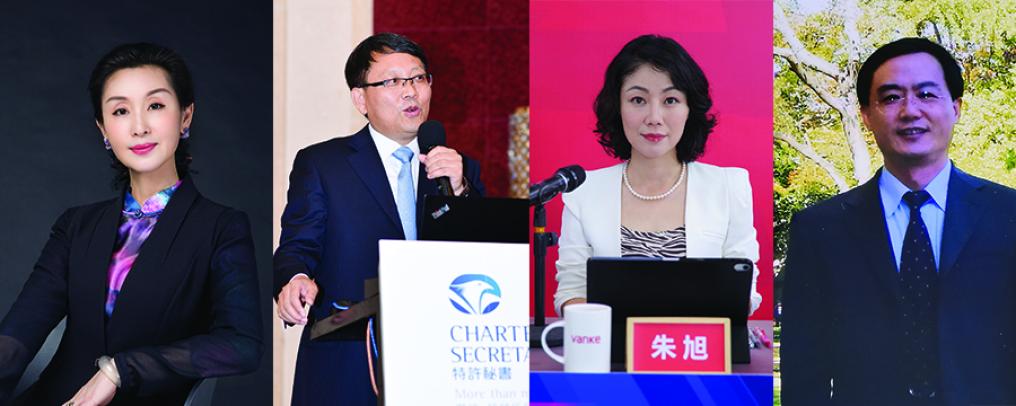Dr Gao Wei FCIS FCS(PE), Vice-President, The Hong Kong Institute of Chartered Secretaries, reviews the Institute’s work promoting good governance and facilitating cross-border compliance in Hong Kong and the Mainland.
As a leading international corporate governance professional organisation, the Institute has been committed to promoting good corporate governance concepts and practices, and enhancing the governance skills and status of governance professionals in Hong Kong and the Mainland.
Before Tsingtao Brewery became the first Mainland company to list on the Hong Kong Stock Exchange (HKEX) in 1993, the Institute had already been invited by the China Securities Regulatory Commission (CSRC) to provide advice, counseling and professional training to help Mainland companies list overseas. By referring to the company secretary system of Hong Kong, including job description, scope of duties and terms of appointment, the Institute assisted authorities in the Mainland to formulate the duties and requirements of board secretaries of Mainland companies looking to list overseas.
Since then, the Institute has continued its mission to promote professional developments in the Mainland. It established its representative office in Beijing in 1996. In 2004, the Institute launched the Affiliated Persons (AP) programme in the Mainland. I was in the first batch of board secretaries to join the AP programme. I decided to take, and then passed, the professional qualification examinations of the Institute in 2009 and launched my professional career in corporate governance.
Promoting cross-border compliance
After years of hard work, the Institute’s professional training is highly praised and recognised by the majority of listed companies and regulatory agencies in Hong Kong and the Mainland. The value of the platform and network provided by the Institute’s AP programme has also become increasingly recognised. At the same time, with the launch of the A+H listing model and the increase in director responsibilities and penalties by regulatory bodies in Hong Kong and the Mainland, major differences in regulatory approaches, resulting from the different legal systems and listing rules, started to appear. This poses challenges for the cross-border compliance work of board secretaries. In this context, the top priority of the Institute in the Mainland has been to reflect the thoughts of APs, to raise issues of common concern for listed companies to the supervisory authorities, to guide and encourage board secretaries to brainstorm new ideas, and to promote and strengthen the technical research capabilities of members.
In 2014, I was honoured to be elected as a Vice-President of the Institute to assist the Council with the implementation of the Institute’s Mainland strategy. In order to address the governance concerns of practitioners in the Mainland, and provide professional guidance to international professional institutions, we began setting up a research team to compile our Guidelines on Practices of Inside Information Disclosure of A+H Companies (the Guidelines) and other relevant practical guidelines. In 2017, the Institute established its Mainland China Technical Consultation Panel (MCTCP) to further strengthen practical research. I act as Chairman of the MCTCP and work with more than 10 members who are all senior members of the Institute, board secretaries and practising lawyers. We organised members and APs into research groups to carry out corporate governance related research projects, and to compile relevant practical guidelines to solve practical problems in members’ work, which built a consensus of members.
In 2012, I, together with PH Chik, the team’s legal adviser, and Kenneth Jiang FCIS FCS(PE), Chief Representative of the Institute’s Beijing Representative Office, as well as several senior board secretaries, started to compile and eventually issued the Guidelines (First Edition) in 2014. This is the first guideline in the industry that incorporates inside information control into the corporate internal control and management process. In 2019, following relevant changes in Hong Kong and the Mainland, the second edition of the Guidelines was released. Now we are working on the third edition of the Guidelines which we target to release in early 2021. At the request of regulatory authorities, we conducted research into regulatory aspects of the Shanghai-Hong Kong and Shenzhen-Hong Kong Stock Connect schemes. In February 2020, we submitted research reports to CSRC and the Shanghai and Shenzhen stock exchanges. We are now compiling our Guidelines on Practices of Connected Transactions of A+H Companies, which is planned to be completed by the end of this year to provide assistance to practitioners in solving complex practical problems in connected transactions in both Hong Kong and the Mainland.
At present, resolving corporate governance issues on a practical level is one of the most pressing problems in the world, a task made harder due to the complexity of corporate governance practices, and the different legal systems, political systems, capital markets, equity structures and cultures involved. No single governance model can solve all governance problems, but good corporate governance concepts and standards are gradually converging across the world, and corporate governance professionals are increasingly expected to follow these legal frameworks and standards to solve their own governance problems.
Mainland companies listed in Hong Kong need to follow relevant laws and regulations of both Hong Kong and the Mainland at the same time. They are faced with the differences in regulation under the civil law and common law approaches and the reality that regulatory authorities do not always grasp the cross-border practical issues. In this context, the Institute’s Mainland research is positioned to solve common problems encountered in listing practices on both sides. In order to lead the professional development of corporate governance, it is highly valuable to bring practitioners together to use their professional skills and collective wisdom to address practical challenges, and communicate with regulatory agencies in Hong Kong and the Mainland.
In 1994, the Special Provisions of the State Council Concerning the Floatation and Listing Abroad of Stocks by Limited Stock Companies (Special Provisions) and the Prerequisite Clauses for Articles of Associations of Companies Seeking for Listing Overseas (the Prerequisite Clauses) were released and implemented. At the time, these regulations made a historical contribution to standardising the governance of enterprises from the Mainland looking to list overseas. However, after 25 years of development, the governance level of Mainland companies listed overseas has greatly improved. The Company Law in the Mainland has undergone five revisions, while the Special Provisions and Prerequisite Clauses have not been revised. Some provisions of these regulations not only have serious restrictions on the capital transactions and development of overseas listed companies, but also violate the Company Law, which causes great compliance risks.
As early as 2009, we carried out research work on the revision of the Prerequisite Clauses, and submitted our Recommendations on the Revision of the Articles of Associations of Companies Listed Overseas to the former International Business Department of CSRC. In May 2014, the Institute and the Board Secretary Committee of the China Association for Public Companies (CAPCO) jointly established a research group. Based on an extensive collection of appeals made by H share companies, the group studied and drafted the Recommended Amendments to the Special Provisions and Prerequisite Clauses to Improve the Environment for H Share Companies Research Report. The report was formally submitted to CSRC by CAPCO and was approved by the leaders of CSRC, but it was temporarily shelved due to the revision of the Securities Law.
On 22 October 2019, the State Council approved CSRC’s request for instructions and issued the Official Reply of the State Council regarding Adjusting the Application of Provisions to Matters Including the Notice Period for Convention of Shareholders Meetings by Overseas Listed Companies. With the support of the International Cooperation Department of CSRC and the majority of H share companies, the MCTCP quickly established a research team, which published its Guidelines on Amendments and Practices of the Related Regulations on Notice Period for Holding Shareholder Meetings in the Articles of Associations of H Share Companies on 28 February 2020. This met the urgent need of H share companies and has been widely praised by our industry colleagues.
In the process of compiling these guidelines, we reached a number of conclusions. Theoretically, the required notice period for shareholders’ meetings can be 20 days under the new rules. However, in practice, due to various factors such as the approval time of the Stock Exchange, closing date of shareholder accounts and shareholder identification, the notice period for a general meeting of shareholders can only be shortened to 38 days, which surprised both CSRC and HKEX. Preparing the guidelines led us to the conclusions below.
- The Institute will use its professional platform in the Mainland to organise members, APs and related professionals to compile relevant practical guidelines. This research aims to meet the expectations of regulatory organisations and listed companies in and outside the Mainland and serve the Institute’s purpose of leading the development of corporate governance.
- The professional platform of the Institute can effectively bring together board secretaries and other corporate governance practitioners from Mainland and overseas-listed companies to solve problems of common concern. The Institute can rely on its members’ practical experience, knowledge and collective wisdom, to quickly complete practice guidelines of high quality.
- The Institute plays an indispensable role for professional institutions in responding to general concerns on behalf of the market, communicating with regulatory agencies in Hong Kong and the Mainland, and promoting the revision of relevant regulations.
Based on the above, and in response to the requirements of CSRC, we have recently consulted H share companies on the amendments to the Prerequisite Clauses and will report back to CSRC in the near future in order to assist them in revising relevant provisions and regulations.
Promoting the governance profession in the Mainland
The new Securities Law approved on 1 January 2020 in the Mainland explicitly stipulated that securities issued in the Mainland are subject to a registration system. The regulatory model has also undergone a major change. Relevant institutions and individuals involved in listing should implement self-discipline in governance matters, supervision of information disclosure has been strengthened, and the accountability and sanctions imposed on directors and board secretaries of listed companies who violate regulations have been increased. Similarly, regulators in Hong Kong are strengthening the responsibilities and accountability of directors and senior managers, including company secretaries. This demonstrates that both directors and board secretaries in Hong Kong and the Mainland will face more scrutiny as the main parties in charge of corporate governance.
Under the framework of corporate governance of listed companies in the Mainland, regulatory requirements and endorsements by regulatory agencies have given the board secretary a special corporate governance regulatory function and an indispensable position. For a long time, board secretaries and directors have formed a division of labour that overlaps with one another in fulfilling their corporate governance responsibilities and ensuring compliance. The Institute’s Council accordingly passed a resolution this year to extend the AP programme to directors. The Institute aims to provide special training for directors, build a communication platform for them, reflect their professional demands and help with their career development. In the future, we hope that the Institute can act as a platform that gathers a wider range of board secretaries and directors from Hong Kong and the Mainland, to discuss and promote better governance practices.
Board secretaries today
With the rapid development of the Mainland’s economy after joining the World Trade Organisation (WTO), there have been waves of overseas listings. Central enterprises, private enterprises, banks and other financial institutions have moved to overseas markets. In this process, overseas capital markets have adapted to, and improved their understanding of, the nature of Chinese companies. Similarly, companies from the Mainland have learned from, and adapted to, the convergence of the different social cultures and capital systems. From the perspective of reform and the overseas listing of Chinese companies, the internationalisation and globalisation of Chinese companies actually started with the internationalisation of capital and shareholder structures, followed by the internationalisation and globalisation of industries.
HKEX has amended its listing rules to allow Dual Class Structure companies to go public, attracting Chinese companies such as Xiaomi and Meituan, as well as Alibaba’s secondary listing last year. Conversely, the Mainland has been learning from, referencing and introducing international best practices. The Mainland’s new Securities Law is a good example of this. However, personally I am more worried about whether the actual operation of listed companies can be changed fast enough to meet the requirements of the new Securities Law. If the ideology and internal procedures of listed companies remain unchanged, there will be great risks in the process of implementing the law.
Frankly speaking, these potential risks are related to our culture. The Securities Law is mainly derived from the UK and the US, and basically follows the logic of the common law, while the Mainland operates a civil law system. Tradition on the Mainland emphasises goodwill, integrity and intentions, while the common law pays more attention to procedures, documents and evidence. In the European and US markets, as in Hong Kong where the common law is enforced, the rules are complex and sophisticated, seeking a good balance between the protection of small and medium-sized shareholders and the commercial operation of listed companies.
Information disclosure in the capital market is reflected in the company’s external communication, behind which is a very complex business, management and decision-making process that involves both conscious and technical issues. We lack theoretical and practical experience in this area. The Institute has long-term domestic and overseas market compliance experience, is responsible for providing best practice examples, and can also play a key role in protecting the interests of the company, as well as directors, supervisors and senior management.
Going forward, as a summary, it is expected that board secretaries should be aware of the following four aspects.
- Compliance and risk awareness. This is a basic skill a board secretary should have.
- Industry and professional awareness. The board secretary must not only understand the securities market, but also understand the management and business of the company.
- Capital and investment bank awareness. This is a competitive advantage of the board secretary and should be carried forward.
- Responsibility and accountability. The board secretary must not only have responsibility for the company he/she works for, but also have responsibility for the securities market and the society. Listed companies are direct users of the securities laws and listing rules. The board secretary has the most profound and three-dimensional knowledge of the relevant system, and should make indispensable contributions to the development of the securities market and the internationalisation of Mainland companies.
Dr Gao Wei FCIS FCS(PE)
Vice-President, The Hong Kong Institute of Chartered Secretaries (HKICS), and Chairman, HKICS Mainland China Technical Consultation Panel
Dr Gao has served as the Institute’s Vice-President since 2014, and is in charge of the implementation and supervision of the Institute’s Mainland strategy.
跨境合规
香港特许秘书公会副会长高伟博士FCIS FCS(PE),回顾公会在香港和内地推动公司治理最佳实践及促进跨境合规的工作。
作为国际领先的公司治理专业机构,公会一直致力于在香港及内地推动良好公司治理理念及实践,提升董事会秘书等治理专业人士的治理水平与地位。 公会自第一家内地公司(青岛啤酒)于1993年在香港联合交易所有限公司(联交所)上市之前,就应中国证券监督管理委员会(中证监)邀请,开始为内地公司境外上市提供咨询、辅导与专业培训等多方位的专业服务,并参照香港的公司秘书制度,协助中证监制定了内地到境外上市公司董事会秘书(董秘)职责与管理办法,内容包括岗位设置、职责范围及任职条件等,为内地赴港上市企业的治理符合要求尽了绵薄之力。 从那时起,公会就初步形成了其内地专业发展的使命,这也是1996年公会在北京设立代表处的初心。2004年,公会在内地推出了联席成员计划,我是最早一批加入此联席成员计划的董秘之一,并于2009年考取了公会专业资格,开始了公司治理专业的职业生涯。推动两地相关法规的修订
经过多年的打造,公会的持续专业培训得到了广大上市公司及两地监管机构的高度评价与认可,联席成员计划的平台价值与网络作用也日益凸显。与此同时,随着A+H上市模式的开启及两地监管机构加大董事责任和处罚力度,两地因法律体系不同,上市规则存在差异等导致两地上市合规实务存在许多重大差异,对董秘的两地合规工作提出了挑战,面临极大的职业风险。如何代表联席成员向监管机构反映和解决上市公司普遍关心的实际问题,引导和鼓励广大董秘集思广益,推动和加强会员及联席成员的技术研究能力,解决实务中存在的问题,成为公会内地专业发展的当务之急。 2014年本人有幸当选为公会副会长之一,协助理事会推动公会内地战略的实施。为了发挥公会解决内地执业人员普遍关心的治理实务问题及国际专业机构的专业引领作用,我们开始成立研究小组编写《A+H股公司内幕信息披露实务指引》等相关实务指引,2017年,公会成立中国内地技术咨询小组(以下简称“小组”)以进一步加强实务研究,本人担任小组主席,与小组中的10多位身为公会资深会员的董事会秘书及执业律师们一起,合力组织广大会员及联席成员开展了多项治理实务调研课题,编写相关实务指引,解决大家工作中的实务问题,取得了一些成果,也获得了大家的一些肯定。 如2012年,本人和小组法律顾问植沛康律师及公会北京代表处首席代表姜国梁FCIS FCS(PE)共同发起并组织部分资深董秘于2014年完成并发布了《A+H股公司内幕信息披露实务指引(第一版)》(内幕信息指引),在业界首次将内幕信息的控制纳入企业内部控制与企业管理流程中。2019年初根据两地有关变化,发布了内幕信息指引第二版。今年我们正进行内幕信息指引第三版的编写,预计明年初发布。应监管机构要求,我们针对沪港通及深港通监管实务问题进行了调研,于2020年2月向中证监及上交所与深交所提交了调研报告,供监管机构规管参考。目前小组正在组织A+H股董秘编写《A+H股公司关连交易实务指引》,计划今年底完成,为广大执业人士解决两地关连交易复杂实务问题提供帮助。 目前,公司治理是世界上唯一在实践层面上未能完全解决的难题,主要是因为公司治理的复杂性,它涉及法律体系、政治体制、资本市场发育程度、股权结构、企业所属行业、文化传统等因素的动态变化,没有哪一种治理模式可以解决所有的治理问题,但国际上良好的公司治理理念和准则却日益趋同,需要公司治理人士在实践中按照法律逻辑、治理准则等解决各自的治理问题。 内地在港上市公司要同时受到内地和香港两地相关法规的规管,面对大陆法和普通法在实际运作中的差异,以及两地监管并不掌握彼此实务问题的现实。在这种情况下,公会内地研究定位于解决两地上市实务中遇到的共性问题,组织执业人士发挥其处理实务的专业技能与集体智慧及沟通两地监管机构,就显得十分有价值,并起到引领公司治理专业发展的作用。 《国务院关于股份有限公司境外募集股份及上市的特别规定》(以下简称“《特别规定》”)和《到境外上市公司章程必备条款》(以下简称“《必备条款》”)于1994年发布实施,当时为规范内地到境外上市企业的治理以满足上市地的治理标准、推动企业国际化发展做出了历史贡献。经过二十五年的发展,内地境外上市公司的治理水平有了很大的提升,内地《公司法》也经过五次修订,但《特别规定》和《必备条款》一直未作出修订,两个法规的一些条款不但存在严重制约境外上市公司资本运作与发展问题,还存在着违背《公司法》的情况,面临较大的合规风险。 我们早在2009年就开展了有关《必备条款》修订的调研工作,并向中证监原国际业务部提交了《到境外上市公司章程必备条款修订建议》。2014年5月,公会与中国上市公司协会(中上协)董事会秘书委员会联合成立了课题组,在广泛收集H股公司诉求的基础上,研究形成了《关于建议修改<特别规定>和<必备条款>,改善H股公司发展环境的研究报告》。该报告由中上协正式上报中证监,得到中证监领导的批示,但因《证券法》修订而搁置。 2019年10月22日,国务院批复中证监的请示,发布《国务院关于调整适用在境外上市公司召开股东大会通知期限等事项规定的批复》。在中证监国际合作部的支持以及广大H股公司的呼吁下,小组迅速成立课题组编写并于2020年2月28日向H股公司发送了《关于H股公司章程中股东大会通知时限等规定的修订及相关实务的指引》(股东大会通知期修订指引),满足了广大H股公司在周年股东大会上提交公司章程修订议案供股东批准的迫切需求。指引获得了广大H股公司及业界同仁的广泛好评。 在编写《股东大会通知期修订指引》的过程中,通过实务调研得出结论:理论上股东大会通知期限新规可以将通知期限缩减到20天,但实践中因联交所通函审批日期、股东账户关闭日期、股东识别等多种因素的限制,股东大会通知期最短只能缩短到38天,这让中证监和联交所都感到意外。通过组织该指引编写,我们有以下几点体会。- 公会在内地利用其专业平台组织会员、联席成员及相关专业人士编写有关实务指引的专业研究定位顺应了内地境外上市公司的“企意”和监管机构的期望,能很好地践行专业机构引领公司治理发展的宗旨。
- 只有公会的专业平台才能有效地汇集内地境外上市董事会秘书等公司治理专业人士来解决共同关注的问题,公会只有依靠和引导全体董事会秘书等公司治理专业人士的实践经验大数据和集体智慧,才能快速完成高质量的实务指引。
- 公会在代表市场反应普遍关切、沟通两地监管机构、推动相关法规修订等方面发挥着专业机构不可或缺的治理作用。
积极推动内地公司治理专业的发展
内地2020年1月1日实施的新《证券法》明确规定内地证券发行实行註册制,监管模式发生重大转变,对上市参与有关机构和个人实行自律治理,重点强化信息披露监管,加大对违规上市公司之董事和董事会秘书的问责和处罚力度。同样地,香港的监管机构也正在加强对董事和高级管理人员,包括公司秘书的责任和问责制。由此可见,两地董事和董事会秘书作为公司治理的主要负责人将面临新的挑战。 在内地上市公司治理框架下,法规规管要求和监管机构背书,赋予了董事会秘书特殊的公司治理规管职能和不可或缺的地位。长期以来,在履行公司治理职责及确保合规方面,董事会秘书与董事形成了分工各有侧重,职能相互交叉重叠的共融局面,可谓一荣俱荣,一毁倶毁。鉴于此,公会理事会今年通过决议,将联席成员计划扩大至董事,以便为该等人士提供专题培训,搭建董事学会交流平台,反映执业诉求,为他们的职业生涯助力并保驾护航。未来,我们希望公会的治理平台可以聚集更广范围的两地董事会秘书及董事等治理人士,形成治理专业发展的两轮驱动,共同探讨及推动治理实务问题的解决及治理的发展。当前国际国内环境下董事会秘书的执业意识观
随着內地经济在加入WTO之后的快速发展,开启了一轮又一轮的境外上市潮,中央企业、大型民企、银行等金融机构纷纷走向海外市场。在该过程中,境外资本市场在不断适应和理解中国企业和东方人的思维方式,中国内地企业也在两种社会文化、资本制度交汇的过程中不断学习和磨合。从改革开放和中国企业境外上市的历程来看,中国企业的国际化、全球化,其实是从资本和股东结构国际化开始的,然后才是产业的国际化、全球化。 与此同时,境外资本市场也是一直在改变,努力争取和适应中国企业上市。联交所,经历了复杂与艰难的努力过程,才得以修改上市规则,允许AB股企业上市,迎来了小米、美团等中国新经济公司,去年又有了阿里巴巴的第二上市。反过来,中国也在学习、参考、引入国际通用做法。新证券法就是一个典型的案例,理念和具体规定都非常先进。不过,我个人比较担忧的是,上市公司的实际运作能否同步随新证券法的实施而作出改变,以适应法律和外部环境的变化。如果上市公司思想意识、内部流程没有改变,在执行新证券法的过程中将会有很大的风险。 坦白讲,这些潜在的风险与我们的文化有关。证券法主要源于英美,基本上是普通法的逻辑,我们是大陆法,中国的传统更多地强调善意、诚信、初心,而普通法更注重程序、文档、证据,他们不会去判断诚信、善意等主观因素。英美市场,包括执行普通法的香港,规则是复杂与精致的,一定程度上体现了对中小股东保护与上市公司商业运作之间的适当平衡。 资本市场的信息披露体现为公司的对外输出,其背后是非常复杂的业务、管理与决策过程,既有意识问题,也有技术问题。我们在这方面缺乏理论与实践方面的经验。公司秘书专业团体有长期的境内、境外市场合规经验,有责任为建立良好治理提供最佳实践,亦可以为保护公司,以及董事、监事和高级管理人员方面的利益方面发挥关键作用。 展望未来,作为总结,期望董事会秘书群体应当具有如下四个方面的意识:- 合規與風險意識。这是董事会秘书的基本功和立身之本;
- 行業和職業意識。董事会秘书不仅要懂证券市场,而且要懂管理,懂公司所处的行业与业务;
- 資本與投行意識。这是董事会秘书的差异化的竞争优势,应当发扬光大;
- 責任與擔當意識。董事会秘书不仅要对所任职的公司,而且要对证券市场,乃至整个社会有责任和担当意识,上市公司是证券法、上市规则的直接用户,董事会秘书对相关制度体系有最为深



